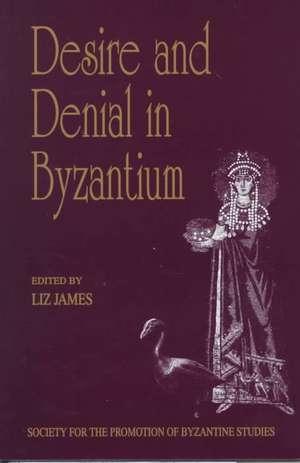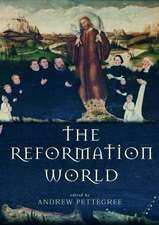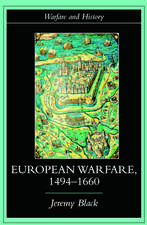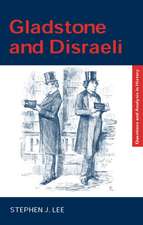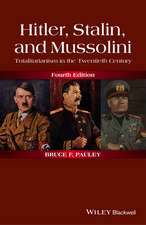Desire and Denial in Byzantium: Papers from the 31st Spring Symposium of Byzantine Studies, Brighton, March 1997: Publications of the Society for the Promotion of Byzantine Studies
Editat de Liz Jamesen Limba Engleză Hardback – 28 mai 1999
Din seria Publications of the Society for the Promotion of Byzantine Studies
- 9%
 Preț: 971.03 lei
Preț: 971.03 lei -
 Preț: 313.19 lei
Preț: 313.19 lei - 25%
 Preț: 766.65 lei
Preț: 766.65 lei -
 Preț: 489.26 lei
Preț: 489.26 lei - 25%
 Preț: 768.64 lei
Preț: 768.64 lei - 30%
 Preț: 770.31 lei
Preț: 770.31 lei - 26%
 Preț: 766.24 lei
Preț: 766.24 lei -
 Preț: 489.26 lei
Preț: 489.26 lei - 9%
 Preț: 1005.04 lei
Preț: 1005.04 lei - 12%
 Preț: 299.52 lei
Preț: 299.52 lei - 18%
 Preț: 1059.45 lei
Preț: 1059.45 lei - 27%
 Preț: 833.77 lei
Preț: 833.77 lei -
 Preț: 401.91 lei
Preț: 401.91 lei - 17%
 Preț: 259.98 lei
Preț: 259.98 lei -
 Preț: 389.49 lei
Preț: 389.49 lei - 20%
 Preț: 262.75 lei
Preț: 262.75 lei -
 Preț: 386.81 lei
Preț: 386.81 lei -
 Preț: 392.32 lei
Preț: 392.32 lei -
 Preț: 394.01 lei
Preț: 394.01 lei -
 Preț: 394.71 lei
Preț: 394.71 lei
Preț: 737.19 lei
Preț vechi: 990.20 lei
-26% Nou
Puncte Express: 1106
Preț estimativ în valută:
141.06€ • 147.67$ • 116.72£
141.06€ • 147.67$ • 116.72£
Carte tipărită la comandă
Livrare economică 05-19 aprilie
Preluare comenzi: 021 569.72.76
Specificații
ISBN-13: 9780860787884
ISBN-10: 0860787885
Pagini: 232
Ilustrații: Includes 15 b&w illustrations
Dimensiuni: 156 x 234 x 18 mm
Greutate: 0.5 kg
Ediția:New ed
Editura: Taylor & Francis
Colecția Routledge
Seria Publications of the Society for the Promotion of Byzantine Studies
Locul publicării:Oxford, United Kingdom
ISBN-10: 0860787885
Pagini: 232
Ilustrații: Includes 15 b&w illustrations
Dimensiuni: 156 x 234 x 18 mm
Greutate: 0.5 kg
Ediția:New ed
Editura: Taylor & Francis
Colecția Routledge
Seria Publications of the Society for the Promotion of Byzantine Studies
Locul publicării:Oxford, United Kingdom
Cuprins
Contents: Preface; Section I: Love Letters?: From Byzantium, with love, Margaret Mullett; ’Shutting the gates of the soul’: spiritual treatises on resisting the passions, Mary B. Cunningham; Section II: Do as your Father tells you: The sexual and social dangers of Pornai in the Septuagint Greek stratum of patristic Christian Greek thought, Kathy L. Gaca; Manly women and womanly men: the subintroductae and John Chrysostom, Aideen Hartney; Anastasios of Sinai’s teaching on body and soul, Joseph A. Munitiz; Divine sex: Patriarch Methodios’s concept of virginity, Dirk Krausmüller; The city a desert: Theodore of Stoudios on porneia, Peter Hatlie; Section III: Problems with Bodies: Desires denied: marriage, adultery and divorce in early Byzantine law, Bernard Stolte; Body vs column: the cults of St Symeon Stylites, Antony Eastmond; Christian bodies: the senses and early Byzantine Christianity, Béatrice Caseau; Writing on the body: memory, desire, and the holy in iconoclasm, Charles Barber; Section IV: Fine Manly Bodies: Passing the test of sanctity: denial of sexuality and involuntary castration, Kathryn M. Ringrose; In denial: same-sex desire in Byzantium, Dion C. Smythe; Michael III and Basil the Macedonian: just good friends?, Shaun Tougher; Section V: Byzantine Erotica: Ninth-century classicism and the erotic muse, Marc Lauxtermann; Erotic imagery on Byzantine ivory caskets, John Hanson; Ostentatio genitalium: displays of nudity in Byzantium, Barabara Zeitler; Section VI: Conclusion: Desire in Byzantium” the Ought and the Is, Averil Cameron; Index.
Descriere
The papers in this volume derive from the 31st Spring Symposium of Byzantine Studies held for the Promotion of Byzantine Studies at the University of Sussex, Brighton, in March 1997. Desire, sex, love and the erotic are not terms usually associated with Byzantium and Byzantine Studies, unlike celibacy, virginity and asceticism, which more readily spring to mind. In order to examine whether the balance between these two extremes needed redressing, desire and denial was adopted as the theme for this symposium. The papers in this volume, by a group of international scholars, explore the many different aspects of Byzantine perceptions towards their own humanity and the frailties of that humanity. Using evidence from archaeology, art history and literary texts, ranging from sermons to legal documents, these chapters reveal writings about love, both secular and religious; images of sexuality and sensuality; the law; and Byzantine attitudes to bodies and the senses. What the symposium illustrated is that the question of desires in the Byzantine world is significant, and that such desires can offer insights into Byzantine conceptions of their own world.
